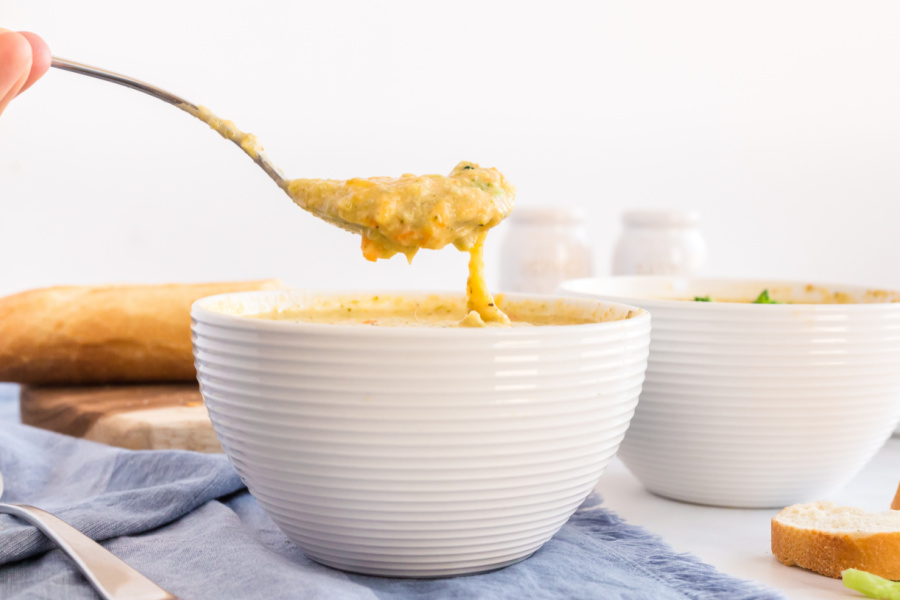The Science Behind Broccoli’s Anti-Cancer Properties In Soup
Broccoli Contains Sulforaphane
Sulforaphane Induces Phase II Detoxification Enzymes
Broccoli Contains Sulforaphane
Sulforaphane is a phytochemical present in broccoli and different cruciferous greens. It has been proven to have numerous health benefits, together with anti-cancer properties.
Sulforaphane Induces Phase II Detoxification Enzymes
One of the ways in which sulforaphane protects towards most cancers is by inducing Phase II cleansing enzymes. These enzymes assist to detoxify carcinogens and other harmful substances.
Phase II detoxing enzymes include:
- Glutathione S-transferase (GST)
- UDP-glucuronosyltransferases (UGTs)
- Sulfotransferases (SULTs)
These enzymes work collectively to detoxify carcinogens and other harmful substances by including glutathione, glucuronic acid, or sulfate groups to them. This makes them more water-soluble and easier to excrete from the body.
Sulforaphane has been shown to induce Phase II detoxing enzymes in each animals and humans. In one examine, researchers found that sulforaphane supplementation increased the expression of GST and UGT enzymes in the liver of rats. In another research, researchers discovered that sulforaphane supplementation elevated the expression of SULT enzymes in the colon of humans.
The induction of Phase II cleansing enzymes by sulforaphane is thought to be one of many mechanisms by which broccoli protects in opposition to cancer. By serving to to detoxify carcinogens and different dangerous substances, sulforaphane can help to stop the development of cancer.
Sulforaphane Inhibits Cancer Cell Growth
Broccoli accommodates sulforaphane, a compound that has been shown to inhibit most cancers cell progress.
Sulforaphane works by activating the physique’s personal defense mechanisms towards cancer.
It has been shown to inhibit the growth of most cancers cells in each animal and human studies.
Sulforaphane can be thought to guard against the development of cancer by lowering irritation and oxidative stress.
Eating broccoli frequently may assist to scale back the chance of creating most cancers.
Cooking Method Affects Sulforaphane Content
Steaming Preserves Sulforaphane
Sulforaphane, a compound present in Broccoli Cheese Soup, has been shown to have anti-cancer properties.
The cooking method used can have an effect on the amount of sulforaphane in broccoli.
Steaming broccoli is one of the best ways to preserve sulforaphane.
Other cooking methods, similar to boiling or stir-frying, can reduce the amount of sulforaphane in broccoli.
It is important to prepare dinner broccoli for a short period of time to preserve the sulforaphane.
Overcooking broccoli can destroy the sulforaphane.

Steamed broccoli is a wholesome and delicious way to get the benefits of sulforaphane.
Boiling Reduces Sulforaphane
The cooking method significantly influences the sulforaphane content in broccoli.
Boiling broccoli reduces sulforaphane content material by up to 90%, while steaming or microwaving preserves it better.
The optimum cooking time for broccoli is 2-3 minutes for steaming and 1-2 minutes for microwaving.
Longer cooking times lead to a decrease in sulforaphane ranges.
Chop broccoli earlier than cooking to extend sulforaphane bioavailability.
Broccoli Soup as an Effective Delivery Method
Soup Enhances Sulforaphane Absorption
Broccoli soup is a nutritious and flavorful dish that gives a number of health benefits. One of probably the most notable advantages is that it could possibly assist to increase the absorption of sulforaphane, a compound present in broccoli that has been shown to have anti-cancer properties.
Sulforaphane is released when broccoli is chopped or cooked. However, it’s poorly absorbed by the physique when eaten uncooked. Cooking broccoli in soup helps to interrupt down the cell walls and launch more sulforaphane. In addition, the soup offers a liquid medium that helps to dissolve the sulforaphane and make it more bioavailable.
Several studies have shown that broccoli soup is an efficient supply technique for sulforaphane. One research discovered that individuals who ate broccoli soup had considerably higher ranges of sulforaphane in their blood than those that ate uncooked broccoli. Another research found that broccoli soup was more effective at inhibiting the growth of cancer cells than raw broccoli.
The anti-cancer properties of sulforaphane are considered due to its capability to induce apoptosis (programmed cell death) in cancer cells. Sulforaphane also has anti-inflammatory and antioxidant properties, which can further contribute to its anti-cancer results.

Broccoli soup is a scrumptious and healthy way to enhance your intake of sulforaphane. If you are on the lookout for a way to increase your health and scale back your danger of cancer, contemplate including broccoli soup to your food regimen.
Soup Protects Sulforaphane from Degradation
Broccoli Soup as an Effective Delivery Method
– Broccoli soup helps protect sulforaphane, a potent compound with cancer-fighting properties.
– Cooking broccoli in water can destroy sulforaphane, but soup protects it from degradation.
– Heating broccoli in soup retains the heat-stable parts of sulforaphane, maximizing its bioavailability.
– The liquid medium of soup facilitates the absorption of sulforaphane into the bloodstream.

Soup Protects Sulforaphane from Degradation
- Heat from cooking can break down sulforaphane, however the liquid surroundings in soup prevents this degradation.
- The water in soup creates a protecting barrier around sulforaphane, shielding it from excessive temperatures.
- The acidity of soup additionally contributes to sulforaphane’s stability, stopping its breakdown.
- The presence of different nutrients in soup, such as antioxidants, might further shield sulforaphane from damage.
